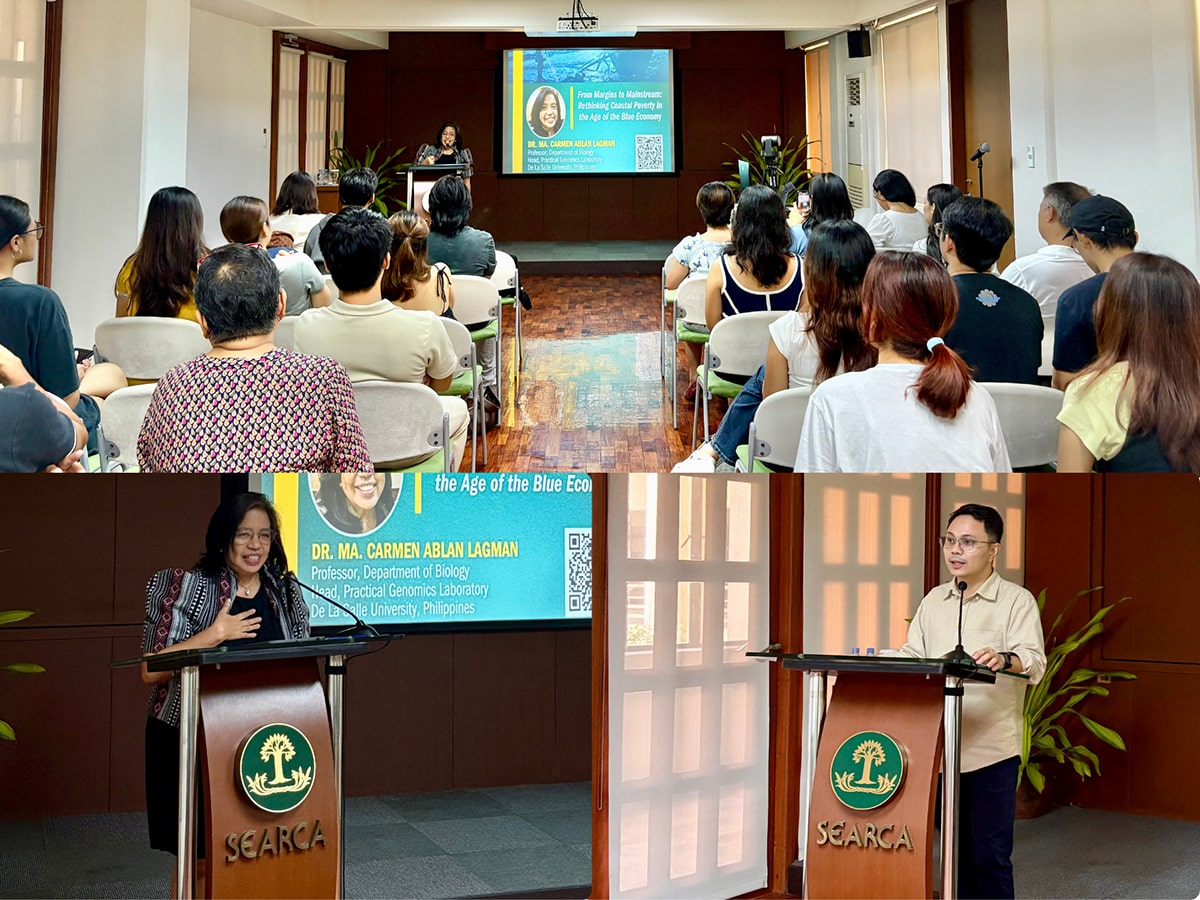LOS BAÑOS, Philippines—Coastal communities across Southeast Asia, long been plagued by poverty despite their proximity to rich marine resources, must be reintegrated into national and local development strategies through the emerging blue economy. This was highlighted in a lecture delivered under the Agriculture and Development Seminar Series (ADSS) of the Southeast Asian Regional Center for Graduate Study and Research in Agriculture (SEARCA) on 20 August 2025.
ADSS speaker Dr. Ma. Carmen Ablan-Lagman of De La Salle University (DLSU) pointed out that the region's oceans hold a huge potential to generate inclusive and sustainable growth. In her seminar, titled "From Margins to Mainstream: Rethinking Coastal Poverty in the Age of the Blue Economy," she emphasized that rethinking development must begin with critical thinking and interdisciplinary collaboration.
"Critical thinking is very hard to develop in a room full of the same discipline people," Lagman told students, researchers, and government officers.
"We need to be consistently challenged and exposed to other people's perspectives. Only then can we find innovative solutions for coastal poverty," she added.
Lagman presented data showing that while the Philippines' ocean economy grew nearly double the national rate at 9.9 percent, its contribution to the gross domestic product (GDP) remains low at only 3.6–3.9 percent. Moreover, declining fisheries and aquaculture, once the backbone of coastal livelihoods, are being offset by rising but precarious employment in other maritime industries.
"Coastal zones in Southeast Asia, where millions of Filipinos reside, remain vulnerable to low incomes, unstable work, and climate shocks," said Lagman, who teaches at the DLSU Department of Biology and leads the Practical Genomics Laboratory.
The ADSS lecture underscored that poverty in coastal communities is structural and multi-generational, driven by a convergence of economic marginalization, environmental degradation, and policy neglect. According to Lagman, despite living beside abundant marine resources, many fishers and aquaculture workers remain excluded from the development process.
"Large-scale industries, commercial interests, traders, and middlemen frequently dominate access and prices, while small-scale fishers and coastal households remain excluded from decision-making, support services, and value chains," she pointed out.
To address these systemic and persistent issues, Lagman outlined strategies for a transformative blue economy. She called for value chain upgrading and certifications to improve product quality, market access, and fisher incomes. She urged adopting digital platforms and traceability systems that connect fishers directly to buyers, cutting dependence on exploitative middlemen. She also pressed for diversification of aquaculture and seaweed products to reduce reliance on a handful of species and open new high-value markets, alongside sustainable innovations such as biotechnology-based feed alternatives and land-based aquaculture systems that minimize environmental impact.
Lagman also stressed the importance of making these innovations appealing and profitable for coastal households.
"If it makes money, it will roll with or without you. Sustainable development must empower fishers to see their work as valuable and viable," she said.
The session closed with a call for collective action, urging young scholars and practitioners from various disciplines to apply their skills to reimagine the future of Southeast Asia's coastal communities. In addition to inclusive policies and innovative thinking, Lagman reminded participants that "interventions for coastal communities should reflect local realities."
The SEARCA ADSS is a regular forum for the exchange of ideas on agricultural and rural development. It aims to foster dynamic discussion and knowledge sharing within and beyond the Los Baños Science Community.
